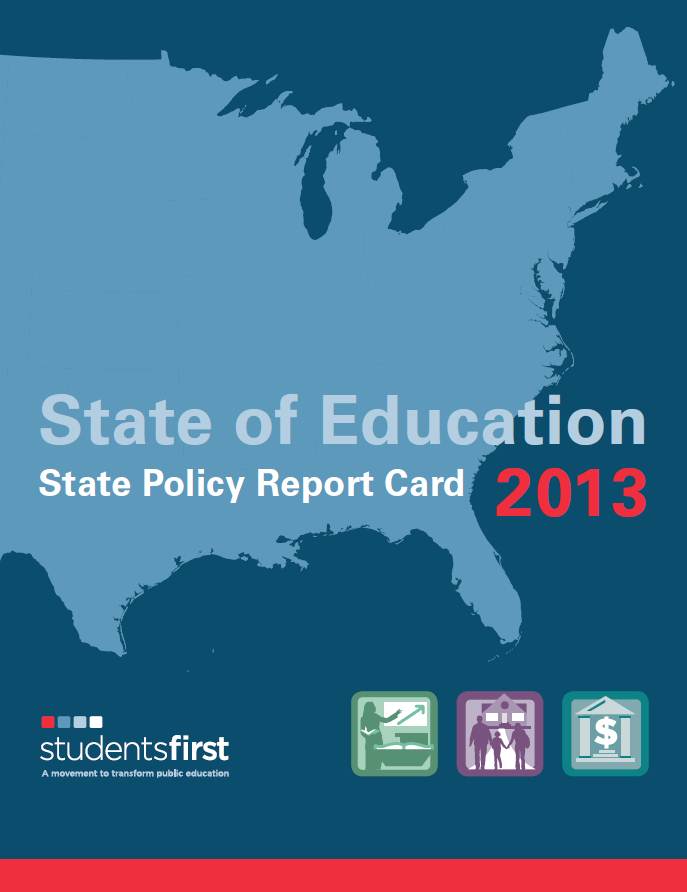What to Think about StudentsFirst’s State Policy Report Card
Blog Post
Jan. 14, 2013
Everyone from U.S. News to David Letterman knows that a surefire way to get attention is to produce a ranking. Few – including my colleagues – can resist their clear-cut simplicity (or the opportunity to be judgmental). Add a controversial figure like former DCPS Chancellor Michelle Rhee to the mix, and it’s no surprise that StudentsFirst’s State Policy Report Card has received so much attention.
Love or hate Rhee, these rankings matter – at least to policymakers, the media, and wonks. Two-thirds of states couldn’t muster a ‘C’ on their report card, which examined twenty-four policies across three categories: elevating teaching, empowering parents, and improving school governance and spending. Only two states, Florida and Louisiana, scraped by with a ‘B-’ average. Now, state policymakers are using the rankings to tout their (relative) success, while others are vowing to use the Report Card as a roadmap for education reform in their states.
Many, including the American Federation of Teachers, have criticized StudentsFirst for excluding student achievement from the grades (yes, you read that correctly: the AFT wants to use student test scores) and focusing only on policy. While the omission is worth noting, it shouldn’t diminish the credibility of the StudentsFirst grades outright. Policy choices matter. They create incentives, signal what’s important, and enable or prevent certain actions at the local level. And it’s appropriate for an organization centered around a policy agenda, like StudentsFirst, to produce rankings focused on whether states have enacted those policies. That said, the only thing I learned from this report card was which states had adopted Michelle Rhee’s favored education reforms.
Those policies, and the theory of action accompanying them, are where I have issues with StudentsFirst. Often, they rewarded states for arbitrary, highly specific choices, without the rationale to support such specificity. For example, StudentsFirst calls for 50 percent of teacher and principal evaluations to be based on value-added data, despite inconclusive research. Why insist on 50 percent for an ‘A’ grade, particularly when the MET project found that "there is a range of reasonable weights" for reliable, composite measures of teacher quality?
Similarly, StudentsFirst rewarded states with A-F school grades to help parents better understand school quality. But if states used alternative ways of labeling schools, like a five-star system, they could not earn higher than a ‘D’ on that policy from StudentsFirst. What is included in school accountability systems is surely as important as how schools are labeled, and there is no reason to think a five-star system couldn’t be as successful as an A-F one.
More troubling, StudentsFirst frequently rewarded states with high marks for enacting the most severe version of reform – even if the policies are new, untested ideas like parent trigger laws. This may not be the wisest choice for state policymakers, as divisive reform agendas are often bogged down in criticism: too extreme, too dogmatic, hastily conceived, and poorly communicated. See: Tom Luna in Idaho, Tony Bennett in Indiana, and yes, even Michelle Rhee in DCPS.
Take the case with parent information about teachers’ effectiveness: to earn an ‘A’ for this policy, StudentsFirst requires parental consent to place students with teachers labeled ineffective. But with something so controversial, it may make more sense to start first with parental notification. This would be a huge policy shift for many states, but warrants only a ‘C’ grade. Further, before you have parental notification about ineffective teaching, states probably want to pilot and refine their teacher evaluation systems so that they are accurate and fair – building buy-in from educators. But without parental notification on the books now, StudentsFirst deems states as failing. Why penalize policymakers for making thoughtful, logical choices about the sequencing and implementation of reform?
Change doesn’t come easy, and it often requires patience and compromise – rather than bulldozing. Policy choices are critical, but building trust and respect among stakeholders can make or break whether those policies take root. In the case of DCPS, many of Rhee’s reforms have been sustained, albeit under the radar by her successor, Kaya Henderson. It’s unclear whether Indiana and Idaho will see similar results. In any case, it would be nice if StudentsFirst could also reward states for taking less severe – but perhaps more inclusive – action to elevate teaching, empower parents, and improve school governance.
Education reform is divisive enough without encouraging all-out aggression. This may not be the Michelle Rhee-way, but it can be an equally effective way to enact and sustain the kinds of reforms Rhee would like to see.
